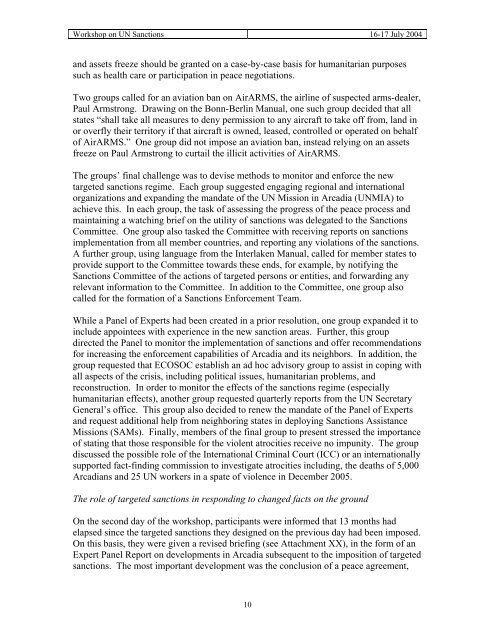UN Sanctions Reform - The Watson Institute for International Studies
UN Sanctions Reform - The Watson Institute for International Studies
UN Sanctions Reform - The Watson Institute for International Studies
You also want an ePaper? Increase the reach of your titles
YUMPU automatically turns print PDFs into web optimized ePapers that Google loves.
Workshop on <strong>UN</strong> <strong>Sanctions</strong> 16-17 July 2004<br />
and assets freeze should be granted on a case-by-case basis <strong>for</strong> humanitarian purposes<br />
such as health care or participation in peace negotiations.<br />
Two groups called <strong>for</strong> an aviation ban on AirARMS, the airline of suspected arms-dealer,<br />
Paul Armstrong. Drawing on the Bonn-Berlin Manual, one such group decided that all<br />
states “shall take all measures to deny permission to any aircraft to take off from, land in<br />
or overfly their territory if that aircraft is owned, leased, controlled or operated on behalf<br />
of AirARMS.” One group did not impose an aviation ban, instead relying on an assets<br />
freeze on Paul Armstrong to curtail the illicit activities of AirARMS.<br />
<strong>The</strong> groups’ final challenge was to devise methods to monitor and en<strong>for</strong>ce the new<br />
targeted sanctions regime. Each group suggested engaging regional and international<br />
organizations and expanding the mandate of the <strong>UN</strong> Mission in Arcadia (<strong>UN</strong>MIA) to<br />
achieve this. In each group, the task of assessing the progress of the peace process and<br />
maintaining a watching brief on the utility of sanctions was delegated to the <strong>Sanctions</strong><br />
Committee. One group also tasked the Committee with receiving reports on sanctions<br />
implementation from all member countries, and reporting any violations of the sanctions.<br />
A further group, using language from the Interlaken Manual, called <strong>for</strong> member states to<br />
provide support to the Committee towards these ends, <strong>for</strong> example, by notifying the<br />
<strong>Sanctions</strong> Committee of the actions of targeted persons or entities, and <strong>for</strong>warding any<br />
relevant in<strong>for</strong>mation to the Committee. In addition to the Committee, one group also<br />
called <strong>for</strong> the <strong>for</strong>mation of a <strong>Sanctions</strong> En<strong>for</strong>cement Team.<br />
While a Panel of Experts had been created in a prior resolution, one group expanded it to<br />
include appointees with experience in the new sanction areas. Further, this group<br />
directed the Panel to monitor the implementation of sanctions and offer recommendations<br />
<strong>for</strong> increasing the en<strong>for</strong>cement capabilities of Arcadia and its neighbors. In addition, the<br />
group requested that ECOSOC establish an ad hoc advisory group to assist in coping with<br />
all aspects of the crisis, including political issues, humanitarian problems, and<br />
reconstruction. In order to monitor the effects of the sanctions regime (especially<br />
humanitarian effects), another group requested quarterly reports from the <strong>UN</strong> Secretary<br />
General’s office. This group also decided to renew the mandate of the Panel of Experts<br />
and request additional help from neighboring states in deploying <strong>Sanctions</strong> Assistance<br />
Missions (SAMs). Finally, members of the final group to present stressed the importance<br />
of stating that those responsible <strong>for</strong> the violent atrocities receive no impunity. <strong>The</strong> group<br />
discussed the possible role of the <strong>International</strong> Criminal Court (ICC) or an internationally<br />
supported fact-finding commission to investigate atrocities including, the deaths of 5,000<br />
Arcadians and 25 <strong>UN</strong> workers in a spate of violence in December 2005.<br />
<strong>The</strong> role of targeted sanctions in responding to changed facts on the ground<br />
On the second day of the workshop, participants were in<strong>for</strong>med that 13 months had<br />
elapsed since the targeted sanctions they designed on the previous day had been imposed.<br />
On this basis, they were given a revised briefing (see Attachment XX), in the <strong>for</strong>m of an<br />
Expert Panel Report on developments in Arcadia subsequent to the imposition of targeted<br />
sanctions. <strong>The</strong> most important development was the conclusion of a peace agreement,<br />
10
















